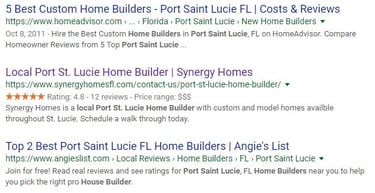Local service pages are essential to local search engine optimization. Businesses small and large struggle with maintaining or climbing search engine rankings whether they have one or 50 different locations.
Without having content on a website, its difficult to rank for those specific terms and more importantly, a customer may be looking for the contact information of a specific store location, but may not be able find that information without these pages. It’s also important to remember that if the page is only used for SEO context and does not provide users with unique value then it’s likely not going to increase in rankings. A local service page should always answer the main questions that users would want answered when reviewing the keywords and search intent. Check out some of your competitors pages that are ranking on the first page. Take note of the elements they use and consider them for your page for a good user experience.

Optimizing a Local Service Page
When creating local service pages, there are many elements that play into the success and ranking of these pages in a local market. For instance, the competitors page that you looked at may be different than the pages I have found. That being said, the creation of the page is nearly the start of the process, its important to review these pages in analytics for optimization opportunities once launched. If you already have service location page on your site, these optimization suggestions may be a good checklist to review on your own pages. If not, please take note of each tactic as an area of opportunity in your local search engine marketing.
Keyword and Location Combination
Likely one of the most time extensive tasks will be creating a list of focus and secondary keywords. There are two tactics I would recommend on this front, with the goal of generating two or three solid keyword targets. The first tactic is scraping your competitors landing pages for keywords that the page is using and or ranking for. Our agency uses SEM Rush and MOZ to get an idea of the keywords used. The second tactic involves the usage of tools like the Keyword Planner in Google Ads or SEO specific tools like MOZ. Enter terms related to your business location into the tools and typically you will be provided suggested keywords related to your entered terms. Google Ads strips out any location tags on keywords, so take that into account when searching. Once a list is created, you should look for the keywords that are most relevant to the service offerings for the page. Additionally, you will want to look for the terms that have a high search volume but are attainable based on your page and domain authority. For more information on domain authority, visit the MOZ explanation.
Unique On Page Copy relevant to the end user
Potentially the most misunderstood element of local service page is the page copy and what it should entail. Of course, the goal here is to create unique page copy that’s relevant to the user and the store front location. However, local search engines optimization is more than just unique content. What I mean by that is, writing how much you love an area or keyword stuffing local landmarks isn’t an ideal practice. As mentioned before, the purpose of the page should be to provide value and answer questions that a user may have when visiting. For example, a user likely doesn’t type in “the best local plumber” to find a page that’s 1,000 words long and stuffed with random facts about the area. Rather, a user is likely coming to that page to find more information about why that plumber is highly rated and to get additional questions answered. Having elements like frequently asked questions, reviews and testimonials is the sweet spot to determining value to the end user and ultimately to Google. The content does not have to be a certain length but should be long enough to answer the questions that a user may have. Don’t forget to sprinkle in the researched keywords throughout content and include them in the page title, meta description and headers. For more information about onsite content, contact our content marketing team.
Local Schema Mark Up
 As a piece of unique code on your website. Schema mark up is used to provide more information to search engines behind the scene. In our opinion, this is a must have on pages if you would like to separate yourself from competitors. As you can see from the screenshot, this local business utilizes schema mark up which passes location, business and review data to the search engines in order to show listings in different ways. In this example, reviews are being pulled in, which can directly stand out among competitors. For more information on schema mark up visit their site. Additionally, if you believe your development team is already using this tactic, it can be tested for free here.
As a piece of unique code on your website. Schema mark up is used to provide more information to search engines behind the scene. In our opinion, this is a must have on pages if you would like to separate yourself from competitors. As you can see from the screenshot, this local business utilizes schema mark up which passes location, business and review data to the search engines in order to show listings in different ways. In this example, reviews are being pulled in, which can directly stand out among competitors. For more information on schema mark up visit their site. Additionally, if you believe your development team is already using this tactic, it can be tested for free here.
Reviews & Testimonials
Reviews and testimonials are another great option to utilize on a local service landing page. The reviews offer validation of the good work that your employees have put forth and can also be a point of reference for your schema mark up. For most small businesses, we tend to lean towards using Google My Business reviews to highlight, but keep in mind that users may find Better Business Bureau or specific industry site reviews on more beneficial.
Contact Information & Map Listing
Last but not certainly least is your locations contact information. Embedding your Google My Business map on a page, adding contact information and hours are staples of a local service page. The usage of these elements helps with your Name, Address and Phone Number (NAP) score consistency which is crucial local ranking factor. Additionally, having contact information is another piece of value that a visitor finds helpful on a page. Make sure that your local listings including your Google My Business match the phone number and address displayed on the page.
These five tips will help you get a jump start on ranking your local service page among search engines. However, some additional items to be aware of are the indexing of your page in Google Search Console, acquiring local links from relevant sites like charities or local chamber of commerce sites and lastly to be aware of paid advertising options like local service ads. If you are feeling overwhelmed with all of the local search engine optimization factors, contact our SEO agency for a free consultation.





